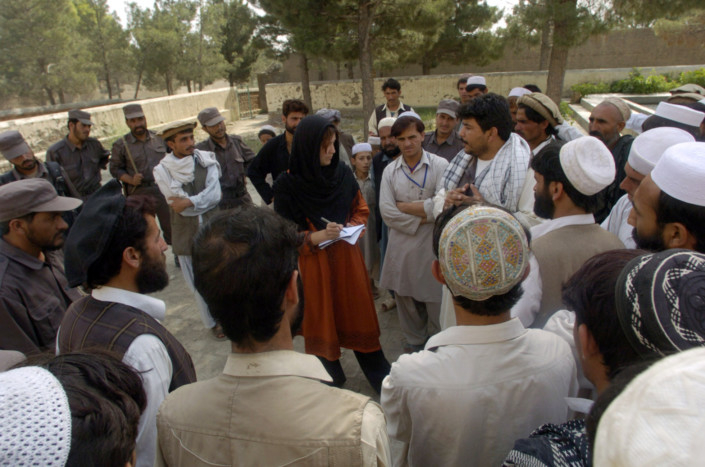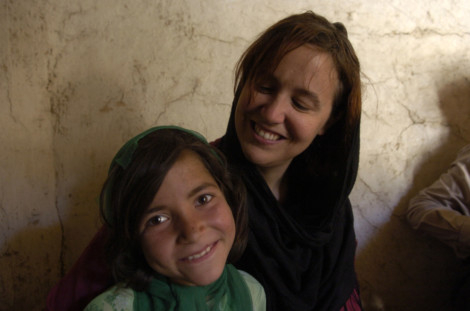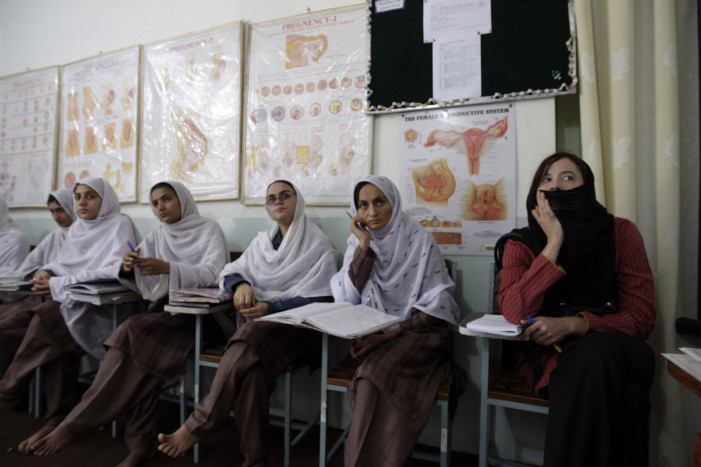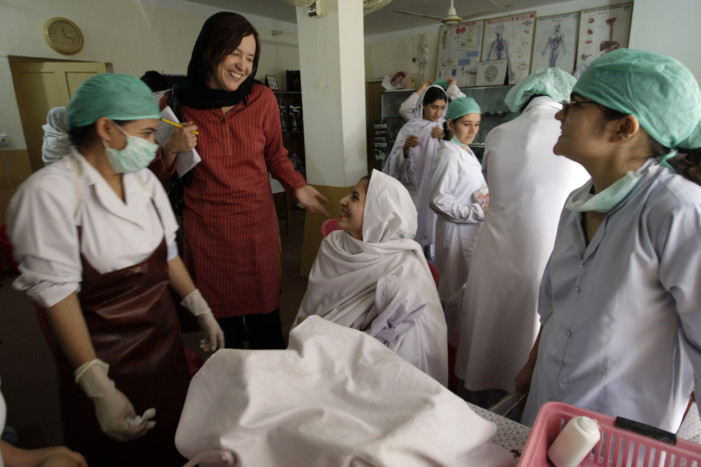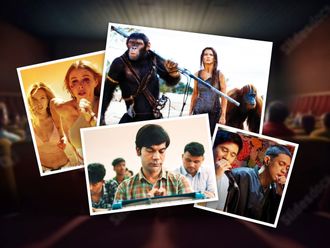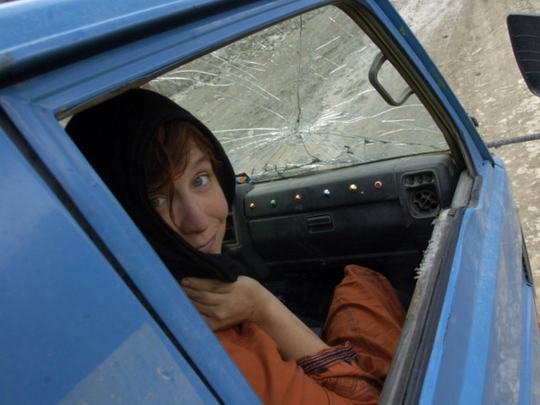
Kim Barker, the former South Asia bureau chief for “The Chicago Tribune”, is the author of “The Taliban Shuffle: Strange days in Afghanistan and Pakistan”. The memoir, published in 2011, is back in the limelight as its adaptation into a Hollywood film — “Whiskey Tango Foxtrot” starring actress and comedian Tina Fey — was released in the US last month.
“I can’t even try to explain to you the surrealness of seeing somebody play a character based on you in a movie,” Barker tells Weekend Review. “I am still trying to come to terms with it, trying to find the words.”
Back in 2011, the “New York Times” published a glowing review of “The Taliban Shuffle”, in which Barker was described as someone who “depicts herself as a sort of Tina Fey character, who unexpectedly finds herself addicted to the adrenaline rush of war”. And within two weeks of the review the rights to the book had been auctioned off to Paramount Pictures.
“We couldn’t really say anything because it didn’t make sense. Just because someone auctioned the book it is really rare for them to make it into a movie. And I was warned about this the entire time,” says Barker.
The names of all the main characters have been changed in the film. “It is only [set] in Afghanistan, it isn’t in Pakistan at all. I kind of get that because it is an hour and 45 minutes movie. To expect viewers to understand the back-and-forth between Afghanistan and Pakistan and all the personalities that are in the book — it is just too much.”
What sets the book apart is Barker’s humorous and lively style of writing, which offers a revealing account of an American journalist’s experience in a part of the world often in the news for the wrong reasons.
Aspects of life in Afghanistan reminded Barker of Montana in the United States. “I grew up fishing in Montana. It was funny because when I was in Afghanistan, I remember I was invited several times to go fishing with the guys there,” she says. “But they always meant using generator lines, putting in this super-surge so they could stun the fish and basically collect the fish they wanted off the top. Whereas I am pretty slow about it, just using a pole and a line, which takes too long to get enough fish. They would also invite me to go hunting. Afghanistan and Montana both have that culture of hunting, fishing, living off the land, having to deal with really harsh winters...”
What about politicians? Did she see any similarities there as well? “It is impossible to say because I have honestly never gotten as close to American politicians as I have got to the politicians in Pakistan and Afghanistan. In America, we have got this campaign finance system that I think is different than anywhere else in the world.”
American politicians spend too much time being beholden to people who fund them, she says. Barker thinks it is different in Pakistan and Afghanistan. “There you are beholden, sure, but you are beholden for almost different reasons. In Afghanistan, it is more for tribal reasons, maybe for corruption reasons, but corruption is illegal there. With our campaign finance system here, it is all perfectly legal.”
In Afghanistan and Pakistan she got the opportunity to meet some of the biggest names in politics. “I found both Hamid Karzai and Nawaz Sharif always very friendly,” she says.
In fact, her interactions with Sharif, who is now the Prime Minister of Pakistan, famously got a bit too “friendly” when — according to Barker in her book — he offered her an iPhone and a chance to be her “special friend”.
Barker sounds wary of journalists who reduce the whole book about Afghanistan and Pakistan into what happened with Sharif (the details of which readers can find in her book.) “What happened was G-rated,” she tells me. “It was nothing. It was barely the purchase of an iPhone. But I find the whole idea of boiling the book down to that very frustrating. I find that it happens in Pakistan, whereas it doesn’t happen elsewhere. So that is just my hesitation in talking about it.”
We talk instead about another notable Pakistani politician, the late Benazir Bhutto. Barker was present at Bhutto’s homecoming from exile in 2007. She talks about attending Bhutto’s first small press conference with a few foreign reporters. “There is a horrible picture of me. We are all sitting around the table and Benazir came in. We ended up sitting almost next to each other and had a bit of small talk. But before we sat down I was looking in a corner across the table, and I think it was perhaps Declan Walsh looking at me. I was just making faces the way you do when you are sitting around waiting.”
As Barker made a funny face, a photographer took a picture of Bhutto. “It’s this beautiful picture with another photo in the background, and she almost looks like an angel — lovely and wonderful — and I, standing right next to her, look absolutely crazed. For some reason it looks as if my head is on top of a really skinny little Pakistani man. I have no idea how it happened but it ran in newspapers in America with no explanation of who I was or what my face was doing there. I was just hoping that nobody in Afghanistan or Pakistan saw it. I mean it was horrible. It was the worst picture ever taken.” Fortunately some of Barker’s “pals” saw it and sent it to everyone.
What was her impression of Bhutto? “She was one of those people who, when she talked to you as a reporter, she made you feel like you were the only person in the room.”
Barker recalls at the time there was talk of Bhutto making a deal with Pervez Musharraf and allegations about her husband, “Mr 10 per cent” Asif Ali Zardari. “You don’t really know what to think,” she says. “And then you meet her and you think, ‘Oh! This is why everybody loves her’, because she is so charismatic. You have to put that stuff aside when you are a reporter. You understand that some people are like that. Most of us are more like human beings, she had that sort of effect. Very mesmerising person.”
The other big leader in Pakistan is former cricketer Imran Khan. In the period Barker was in the region Khan didn’t have as big a following as he does now. “No he didn’t. That certainly came up in more recent years.”
Barker talks about interviewing Khan one-on-one when he was under house arrest. “Musharraf had him under house arrest. I thought, ‘Oh come on! You are under house arrest here?’” she says. “It is hardly a hardship. He was in that huge gorgeous house outside Islamabad. I interviewed him there. We were talking about the charismatic politicians, he is much like that as well.”
And then Barker did another story about Khan in which he spoke of his appeal among the youth. “At one point during the lawyers’ movement, I think he had been arrested and I sort of followed him around as he was campaigning. They let me into a couple of situations where he was strategising, but of course they don’t talk about anything negative when the Western reporter is there.”
Her book has been re-released as “Whiskey Tango Foxtrot”, same as the film’s title. The book’s original name “The Taliban Shuffle” had a musical association. “Music has always been super-important to me,” she says. What sort of music did Barker listen to out there in Afghanistan? “When we were driving from Kandahar to Kabul, I had an iPod and it would connect to the radio. So you could play whatever you wanted and the entire car could listen to it. Whatever I picked, I couldn’t just pick the Western alt-pop-rock that I loved.”
Barker was always concerned about making sure her Afghan companions enjoyed what she was listening to. “You want your driver to be happy and awake. And so you just had to have a good beat. Sometimes I made them listen to Iggy Pop, you know, sort of stuff from the 1970s. Because I felt like that stuff is so universal, they would love it.” However Barker’s fondness of that kind of music was not such a hit. She tried different singers such as David Bowie and Rolling Stones, with little luck.
So Barker would turn to safer music everyone liked. “There is plenty of Bollywood music that I like. And I really love all the Habibi songs from the Middle East ... [so you] put on these dance beats that are fun to listen to, and fun for the driver.”
I ask for names of some Indian or Afghan singers Barker remembers, and she struggles. She knows the music but it’s a “totally different language” for her. She manages to recall a famous Afghan singer from the 1970s. “I am actually looking this up online because Farooq [her Afghan fixer] would actually kill me if I didn’t remember this. I know I wrote about it. Do you want to ask me the next question? I will come up with his name because I just can’t remember it.
But before I can do that, Barker remembers. “Afghan Elvis! He was known as the Afghan Elvis. I wrote about it. His name was Ahmad Zahir. His story is so epic. I think he was killed. He died under mysterious circumstances in 1979. After the fall of the Taliban, you could play music publicly in Afghanistan. I think Ahmad Zahir was just everywhere.”
Listening to Barker’s fascinating tales I can see what attracted Hollywood to turn her into a film character. Barker herself didn’t write the script for “Whiskey Tango Foxtrot”. “I talked a lot to the screen writer, a guy by the name of Robert Carlock, who is Fey’s right-hand man and was the showrunner ‘30 Rock’,” she says. “He met me and other folks within Afghanistan and Pakistan. There is a lot in the movie that happened to my character, but didn’t really happen to me, right? It is very clear if you read the book and compare. But a lot of the stuff that happened to my character in the movie did happen — just [that it happened] to other people. They just threw it all on me or people right around me,” she says.
Barker has seen the movie once. The film’s narrative very much follows Barker’s personal narrative arc. “I think that it correctly shows the bubble that we lived in when we were in Kabul. It strictly focuses in on that in the book.”
Barker met Fey and they had lunch together. She had opportunity to “hang out” with Fey and some other actors for a couple of days on the set. “It is funny because people say to me, ‘Oh, she must have spent a lot of time with you because in the trailer she has this expression which looks just like yours’. I told this friend, I think we just look alike a little bit and we act alike a little bit, but she is doing her own interpretation of this character which is Kim Baker and not Kim Barker.”
Fey is famous for portraying US politician Sarah Palin, and now she is portraying Barker. I joke that maybe all three of them are connected in some way. “That means Sarah Palin can play me in the next [movie],” Barker says, laughing.
And where does she get her humorous style of writing from? “I credit my father,” she says. “My father is very funny. My mother is kind of funny but less so. She will probably kill me if she ever reads that. My father has got some funny siblings. We grew up in a household — me and my younger brother — where laughter was pretty much a part of it. And teasing each other. There is this sense of a dark comedy.”
Writing humour is not easy. “It is hard to make people cry with your writing. It is harder, I think, to make people laugh. It is actually really challenging. You know you have to keep going over it. Keep trying to look for the right word, or the right turn of phrase. Obviously sometimes you are writing about things that are so sad it would be completely inappropriate. So I try to know where that line is. I don’t always succeed.”
In Afghanistan and Pakistan she was always running around from “bad thing to bad thing” with the occasional funny or political story.
At the “New York Times” she feels she gets to dig around a lot more and works with a “great investigative team” on the Metro desk. “It’s a choice I make every day to be here and I miss it,” she says. “I miss being in Pakistan. I miss being in Afghanistan. I miss the whole sense that everything you did just mattered so much over there. And you were watching such an important story unfold right in front of you. I miss that sense of talking at dinner parties about the future of the judiciary in Pakistan as if it was the most important thing. Going back and forth with Aitzaz Ahsan and Tammy Haq about these issues.”
However, she insists she is leading a more “balanced” life now and can do activities such as walk down the street and go to the gym.
Catching a hold of Barker for this interview was a mission in itself. One day when I contacted her she was at the physician, another time Barker she was in court. Yet another day she had to cancel after fixing a time as she was on deadline following a stabbing at a shelter. “I am just trying to as much as possible keep my head down and just keep doing my job. I am trying not to let this whole thing take me away from who I feel I am.”
With the release of this movie, Barker finds herself being invited to give speeches on Afghanistan. “One of the good things that can come out of this movie [is] if a lot of people watch it and say, ‘Hang on, wait a minute. What’s going on in Afghanistan now?’, if we can have more of a dialogue about what exactly is going on out there, and what should be going on there. So now, I am having to give all these speeches because the movie is out, it’s hilarious. People want me to talk, I think in some cases because Tina Fey is in the movie, and I am thinking — it doesn’t have anything to do with my sense of expertise in the region.”
Syed Hamad Ali is a writer based in London.



